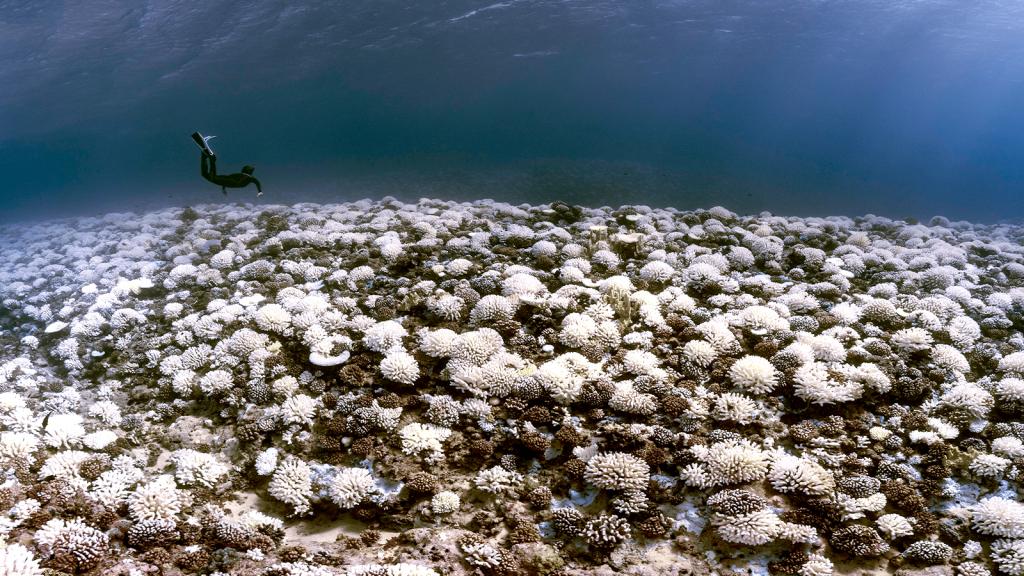
Love is in the air.
Photo: iStockphoto
The on-again-off-again flirtation between big business and the mainstream environmental movement seems to be progressing into a full-on steamy love affair — and perhaps even a committed, long-term relationship.
On Tuesday morning, a handful of Fortune 500 execs joined Jonathan Lash, president of the environmental think tank World Resources Institute, to testify before the Senate Environment and Public Works Committee in favor of a mandatory federal cap on greenhouse-gas emissions. “Voluntary efforts alone will not solve the [climate-change] problem,” DuPont CEO Chad Holliday told the assembled senators. He added, “We see a whole suite of technologies to solve these problems, and we think the uncertainty of what regulations will do are holding companies back.”
Committee Chair Barbara Boxer (D-Calif.) had invited the corporate and environmental leaders to explain why they’re increasingly concerned about global warming. Their unified testimony made an impact on at least one prominent Republican, Virginia Sen. John Warner, who could be a swing vote on climate legislation in the committee. “A group like this, you’ve got my attention,” Warner said.
Holliday and Lash are both participants in the recently hatched U.S. Climate Action Partnership, as are two other witnesses who spoke at the hearing, Peter Darbee of Pacific Gas and Electric Co. and Steve Elbert of BP America. U.S. CAP, a coalition of 10 corporations and four green groups, is pushing for greenhouse-gas limits strong enough to slash emissions 60 to 80 percent by mid-century.
Directly after the hearings, Holliday and Lash hightailed it to New York City to join other corporate leaders and toast to their budding romance at a glitzy dinner party celebrating WRI’s 25th anniversary.
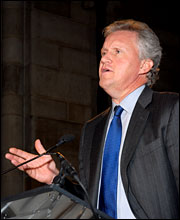
GE’s Immelt was honored at the WRI birthday bash.
Event photos: Krasner/Trebitz, World Resources Institute
The gala, held at the chic Cipriani on 42nd St., was big on many levels — big turnout (nearly 700 well-heeled folks, nary a soul in Birkenstocks), big political and corporate star power (Al Gore, New York Times columnist Thomas Friedman, and General Electric CEO Jeff Immelt took turns at the mic), big bucks (WRI raised over $2 million), and big, bold rhetoric affirming that the corporate-green alliance is now hot and heavy.
In a cathedral-like room with soaring ceilings, walls of burgundy marble, and chandeliers the size of jet engines, WRI doled out “Courage to Lead” awards to corporate titans and deep-pocketed donors deemed notable for “their vision and their actions to the cause of sustainable development.” The recipients included Immelt, whose company has been greening its business strategy via an “ecomagination” campaign; the late Samuel Johnson, founder of SC Johnson and a former member of WRI’s board of directors; and Jonathan Fanton, director of the John D. and Catherine T. MacArthur Foundation, who announced during his acceptance speech his organization’s new plans to commit $5 million over the next three years to climate research.
The crowd was dotted with representatives from companies belonging to the CAP alliance — GE, Alcoa, BP, Caterpillar, DuPont, Lehman Brothers, PG&E — as well as environmental groups involved — Environmental Defense and the Natural Resources Defense Council. Other attendees represented a veritable who’s who of powerful corporations: Bank of America, Coca-Cola, Goldman Sachs, JPMorgan Chase, Shell, Wal-Mart, and Weyerhaeuser. Citigroup Global Wealth Management underwrote the dinner.
A smattering of political notables were on hand too, including Rep. Mark Udall (D-Colo.); former Colorado Sen. Timothy Wirth, now president of the U.N. Foundation; and former deputy secretary of state Robert Zoellick, who left the Bush administration last summer to join Goldman Sachs as international vice chair.
Surveying the double-starched crowd as the festivities wound down, Lash told Muckraker, “I started out my career doing war against these companies, and here we are all having dinner together and planning the future. It’s amazing!”
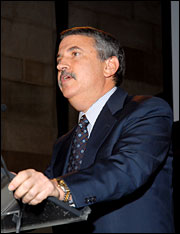
Thomas Friedman warms up the crowd.
The emcee for the evening, Thomas Friedman, echoed his euphoria. “Look around the room,” he told Muckraker. “If there’s gonna be a solution on climate, this is what it’s gonna look like. You never would have seen this [collection of people] five years ago.” What changed? “The reason the climate issue is taking off right now is above all because business leaders are embracing the profit potential of developing green technologies, and the only way these solutions will scale [to mainstream use] is if you have what we see here — NGOs, government, and business working together.”
Friedman stressed to the crowd that the theme of the night was optimism — a marked departure from the doom and gloom oft associated with the environmental community. “Somebody once said that in the history of the world, pessimists are usually right, optimists are usually wrong,” he said. “But all the great change in history was made by optimists. If there’s a common denominator between WRI and all the people honored here this evening, it is that optimism.”
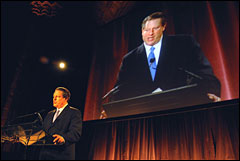
Al looms large.
No night of big-name green revelry would be complete without Al Gore, and indeed he stole the show, inspiring the less wizened in the crowd to jump up and cheer. He presented the “Courage to Lead” award to Immelt, noting that global warming is posing “a challenge to the moral imagination” of America, and that GE is in the vanguard of companies rising to meet the challenge.
Friedman wrapped up the evening with a nod to the possibility of another Gore presidential run. “We are in a political season and the rules governing columnists at The New York Times is that we are not allowed to endorse presidential candidates,” he said from the podium. “But I’m going to break that rule tonight if you promise not to tell anybody: I’d like to nominate Al Gore and Jeff Immelt as the geo-green candidates for 2008!”
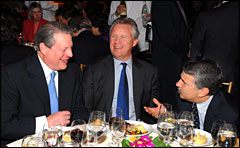
Gore, Immelt, and Friedman schmooze it up.
Such a pairing of leaders would certainly consummate the marriage of business and environmental goals.
But not everyone is sure it’s a match made in heaven.
Gus Speth, one of the founders of both WRI and NRDC and now dean of the Yale School of Forestry & Environmental Studies, told Muckraker that to him the evening demonstrated “that WRI has reached some new plateau of engagement with the business community, and that means a good thing and a bad thing, because it means you have the potential to really develop a huge constituency with a very influential group of people, but it also means that you have the potential to get yourself really boxed in on things.” In other words, enviros shouldn’t get to the point where they only advocate solutions that serve the bottom line, because, of course, not all necessary environmental solutions do.
“In a way, if you cast so much of your energy with the business side, you’re making a bet, and you can win big or you can lose big,” Speth said. “So I would say [to the green community]: hedge your bets.”

